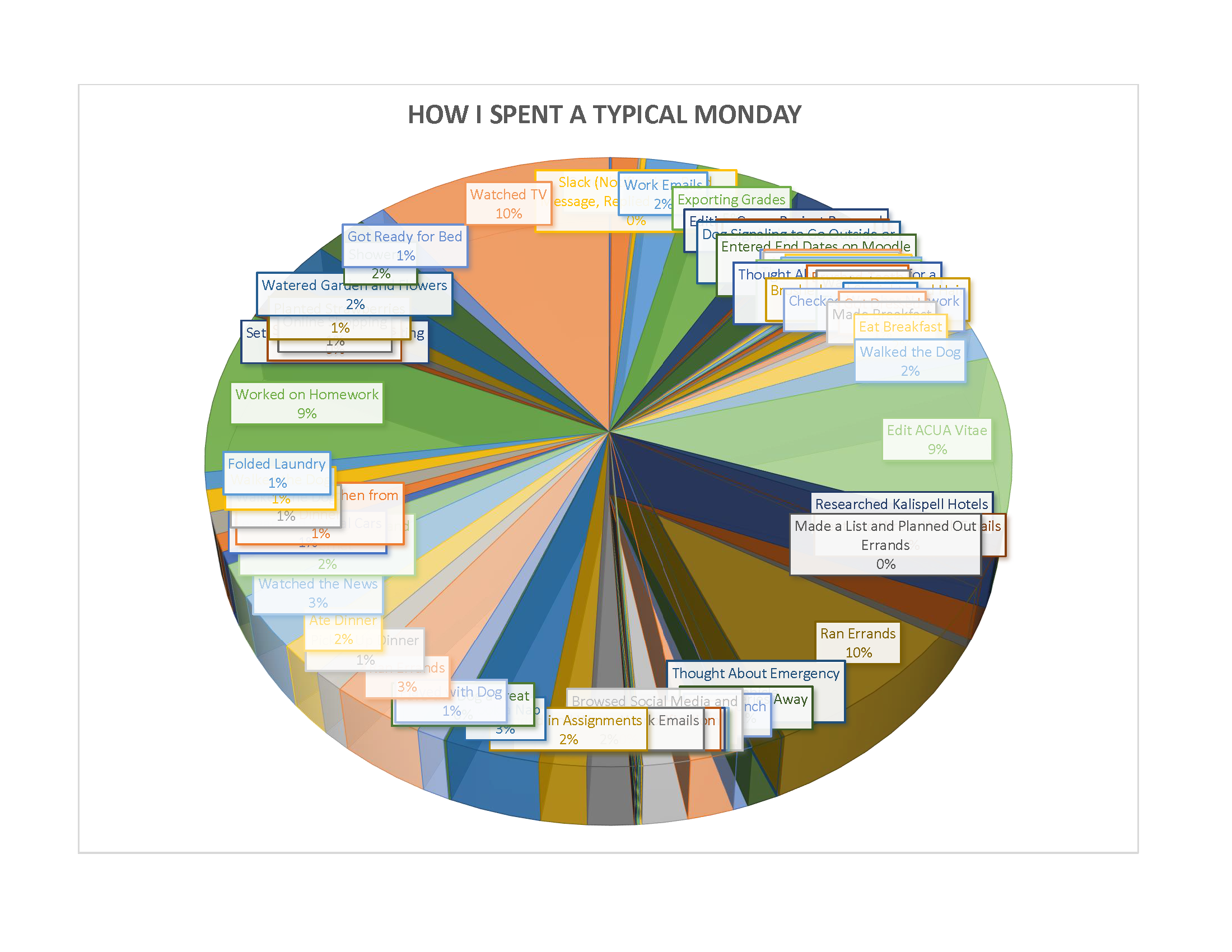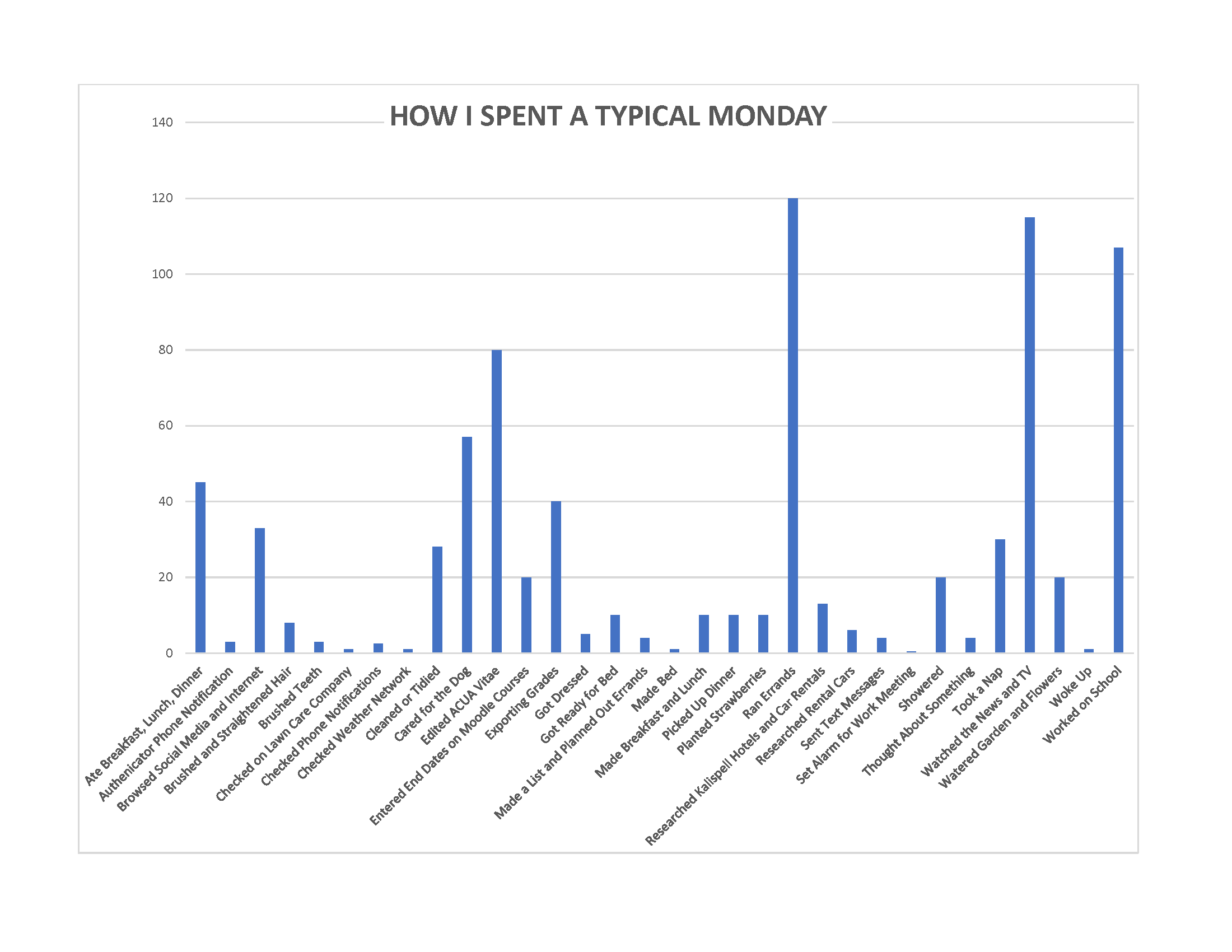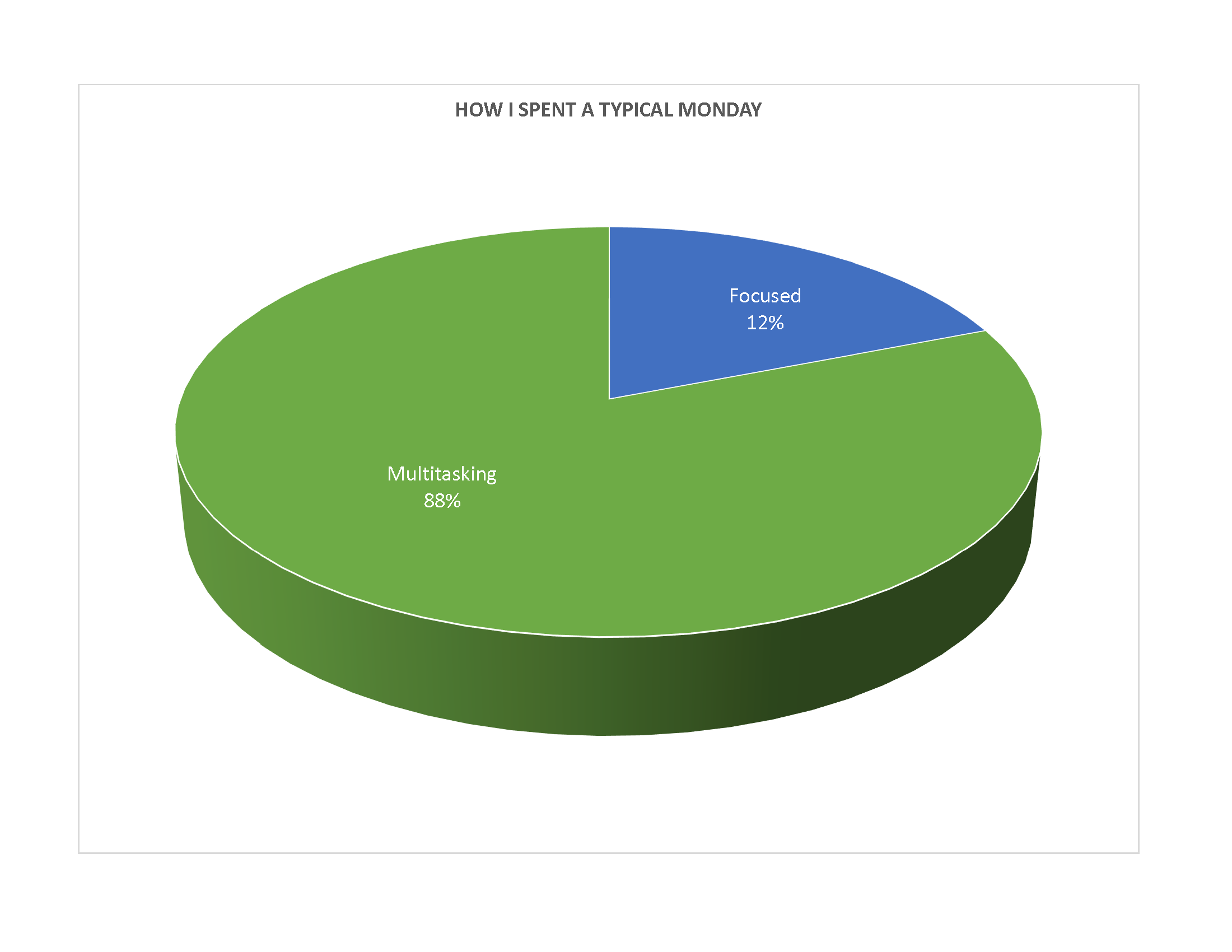A typical Monday for me, includes working from home, getting ready for the work week, running weekly errands such as picking up groceries or going to the pet store, and doing some school work. When I set up for this task, I thought it would be best to keep track of what I paid attention to on a Monday, as my Mondays are pretty consistent and, because I work from home on Monday’s, I would have the time to sit down each hour and reflect on what I paid attention to. For me this task ended up being a bit more time consuming then I originally imagined; and I’m not sure how natural it was, as I was constantly thinking about what needed to be included in my reflection and grabbing my phone to make notes.
Here is how my Monday went…
I woke up at 8:30 a.m., before my alarm went off; this is pretty normal for me. I quickly checked my phone; I just had regular notifications – don’t forget to track your breakfast, and Twitter and Apple news updates. I immediately got up and the dog was at my feet ready to go outside for his walk. I got dressed and brushed my hair so I was somewhat presentable if ran into a neighbour during the morning trek. Down the stairs we went for Buckley’s first walk of the day. I got home and gave him is morning treat. I’m not a coffee drinker, so back upstairs I went. Instead of getting ready for the day, I was already distracted from the thoughts I had during my morning walk with Buckley. I opened my computer. It was the first week after spring term ended and I knew that there would be final assignments that needed downloading, grades to be exported and populated into PeopleSoft so that students would be able to see their final grades, and instructors who would need some tech support to wrap up before their summer break. Again, I checked my phone and during my walk it notified me of some Slack messages that I had received; I quickly read through and replied to the messages while my computer was turning on. I spent the next 90 minutes doing some really typical work tasks. Reading and replying to emails, exporting grades from Moodle, entering end dates on the spring Moodle courses, texting with colleagues, and setting up appointments to provide some one-on-one tech support with my colleagues. I also had an assignment due for school that day, so I also opened the assignment so that I could do one more final edit before getting the links ready to hand it in. On Monday’s, as I mentioned above, I run errands for the week. I was in desperate need to hit a grocery store, and was also mentally making a list in my head.
Around 10:30, Buckley distracted me. He was signaling that he needed something. I looked at my phone and realized that he had missed his 9:30 a.m. breakfast and may need to have a quick bathroom break. I also realized that I had not fully got ready for the day and that I had also not eaten breakfast. I went downstairs and fed Buckley. While I was feeding him and he was eating, I did a quick social media scroll. I also thought about my garden/flowers needing water and that I should measure to buy a new pea fence. I went back upstairs and quickly checked my work emails, I heard the lawn care company show up, which I forget about and while I was doing this and checked outside the window of my room to make sure that all was well for them to go about their work. I got ready for the day, however, while I was getting ready, I was listening for notifications on my phone and computer. After getting ready, I finally went downstairs and made breakfast. While eating breakfast, I sat at the kitchen table with a copy of a magazine that I publish. I edited it. Buckley signaled me again that he needed to go outside for a bathroom break. I thought about how nice it would be to have a backyard. I live in a condo and a quick bathroom break means harnessing up and going for a quick walk.
I got back from my walk and finished editing the magazine I help publish – ACUA Vitae. I had to focus on this task, as I had not had a chance to read any of the articles for content and always want to make sure the contributors to ACUA Vitae are accurately credited for articles they write and photos they take. I purposely continued to do this at my kitchen table. My computer was upstairs and I wouldn’t be able to hear notifications, which would tempt me to focus my attention else where, and although my phone was next to me, I ignored all notifications while I did this. Towards the end of editing ACUA Vitae, which took 80 minutes; I started to get distracted. My thoughts moved towards a trip I have planned the following weekend to Waterton National Park and Kalispell, MT. I realized that I had to book a hotel in Kalispell and was thinking that renting a car might be a better way to travel for this trip. I had to really focus on getting the editing done, so that I didn’t automatically pick up my phone and start researching hotels and car rentals. Once I was finished, I made a list of things that I needed to pick up during my errands and spent some time quickly researching hotels. I also went back upstairs to check on work emails; I read and replied to emails.
It was early afternoon, and work was pretty much wrapped for the day. I had a list of errands to run. I ran my errands. I was more difficult to track what I was doing, as I was driving, grocery shopping, etc. I wanted to get these things done and found that I didn’t stop to reflect on what I was doing or where my attention was focused. I did note, that while driving, I listened to the radio and looked at a few notifications that came in on my phone. At one point, there was an emergency vehicle and I was very focused on getting my vehicle out of the way of this fast-moving fire truck. I got home and put things away; again, I was thinking about a load of laundry that needed to be transferred to the dryer and an errand that had to be done that day in the early evening. I also remembered that I hadn’t eaten lunch, and decided to make and eat lunch. I took a break, ate lunch, scrolled social media and the Internet, and had the TV on, and found it interesting that with all this stimulation around me, decided to take a nap. I also found it interesting that my nights are pretty routine but, again, I multitask through the evening. I spent about an hour focused on reading for school, and then watched TV, texted with family and friends, folded a load of laundry, researched car rental companies, put the load of laundry away, got ready for bed, walked the dog, watered my garden, planted some strawberries, and did some online shopping.
Graphical Analysis…
I purposely created a pie chart with all of the tasks I completed on this Monday. It looked messy but I thought, there was no better way to depict the organized chaos (or multitasking) events that took place throughout my day. I was curious how I spent my day, so I tried to categorized the tasks I completed and found it interesting that a big part of my day was spent caring for Buckley; I wasn’t surprised that work and school tasks occupy a lot of my time as well. The tasks that don’t take a lot of time – checking phone notifications and scrolling social media, are distractions or multitasking events that I performed while completing a primary and secondary task. I’m also very aware, that I likely did not track every single “thing” that I was paying attention to. Last, I wanted to get an idea of how much time I spend multitasking vs focusing on one activity; I am not surprised that the majority of my day is spent multitasking.
Attention and Education…
Citton (2017) indicates that teachers and students have different attentional systems and cognitive modes. Teachers imagine lessons that require deep attention from students, while student have formed habits of hyper-attention, allowing themselves to switch their focus rapidly among different tasks. Based on the analysis of my typical Monday, I believe that humans of the digital age, including myself, are forming hyper-attention habits and are able to multitask using different information streams and require high levels of stimulation to keep focused. Throughout my day, I was multitasking the majority of the day and some of the multitasking tasks were unnecessary distractions, but even with these distractions, I was able to focus my attention on a primary task. Citton (2017) argues that attention is a commodity in short supply. As we continue to form hyper-attention habits, deep attention may be something that we may have to commit to. For myself, when I have to really pay attention to something, I have to remove my computer and phone so I am not tempted by a notification or to start multitasking. As an educator, I feel pressure to ensure my students are able to learn using hyper-attention learning habits that they have formed growing up in a digital age so they are not bored. For example, I recently learned that at the school I teach, more than 80% of the adult students we teach are completing their course work using phones. I’ve always thought it was important to provide learning activities that are accessible on as many digital devices possible and to provide activities that are multi-modal and stimulate learning in different forms, but knowing that most of my students are using Moodle and completing readings and assignments on their phones, reinforces this for me.
References
Citton, Y. (2017). Introduction and Conclusion: From Attention Economy to Attention Ecology. In The Ecology of Attention. John Wiley & Sons.


